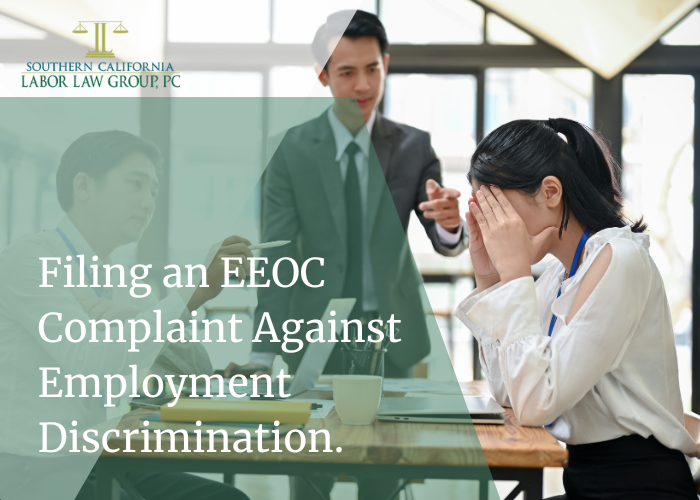Workplace discrimination is like an internal injury that is not visible but the pain is very severe. In a vibrant city like California with its industry, resources, and economy, complaints of employment discrimination are a common sight. However, if the discrimination complaint is filed in the EEOC quickly and without any delay, the right result is obtained. Unfortunately, many workers in California whether they belong to any of the four protected classes are still unaware of filing a complaint with EEOC. If you are also one of them then this blog post is your way to go. The expert EEOC lawyers at Socal Employment have indulged this post about the EEOC complaint filing process as well and this post will also make familiar with ‘how an EEOC complaint hurts an employer’. But first, let’s start with what is protected class is and its types.
Protected class: The definition and what are four protected classes under Title VII in California:
A category of humans in the Golden State that are legally protected against discrimination based on attributes such as national origin, gender, race, or religion is known as a protected class.
Four Protected Classes Under Title VII in California:
- Race/Color
- National Origin
- Sex
- Religion
In California, filing an EEOC complaint on discrimination at work involves the following steps:
Check Eligibility: Find out if your situation qualifies as employment discrimination under Title VII of the Civil Rights Act or California employment law.
Value the Statute of Limitations: After the date of the discriminatory act, you may submit an EEOC complaint within 180 days as per the state statute of limitations for claim filing. This period is increased to 300 days if a state or local fair employment practices agency implements laws that prohibit the same kind of discrimination in the workplace.
Register the complaint: There are three ways to file an EEOC complaint:
- Online via the EEOC Public Portal.
- In-person complaint by visiting the EEOC office.
- By email access the EEOC website.
You can also print up the “Intake Questionnaire” (EEOC Form 283), complete it, and ship it to the nearest EEOC office.
Support the Investigation: If the EEOC decides to launch an investigation, offer any further data or supplementary files that might be needed. Alternatively, the Equal Employment Opportunity Commission may recommend mediation as a way to resolve the dispute without carrying out a protracted investigation.
Get the EEOC Decision: Following the investigation, a ruling will be released by the EEOC. EEOC lawyers will attempt to negotiate a settlement with your employer if they determine there is a good basis to suspect discrimination took place. You will receive a “Dismissal and Notice of Rights” (right to sue letter) if no reason is identified.
Want to know how an EEOC complaint hurts an employer? Ask us at Socal Employment.
An employer may be severely impacted by an EEOC complaint. It starts a formal inquiry into claims of discriminatory activities, which may have negative financial and legal ramifications. If found guilty, employers could have to pay high legal costs, possible settlements, or damages. Furthermore, the probe may harm the company’s brand, which might have an impact on public opinion and staff morale. For filing an EEOC complaint to adhere to EEOC regulations, the procedure also requires a significant investment of time and money from the employer and most importantly legal assistance from Socal Employment.
Conclusion
Under the legal support of EEOC lawyers at Socal Employment you must take action if you think you have been the victim of job discrimination. You may defend your rights and possibly bring about big changes at work by submitting an EEOC complaint along with evidence and related technical documents. Don’t be afraid to get legal counsel if you want to handle the procedure well by filing an EEOC complaint. An EEOC attorney can offer the knowledge and experience required to increase your chances of a favorable result. Defend everyone’s right to a fair and equal workplace by speaking out against discrimination. Contact us at (424) 688-1057 to get more info on social labor law.
